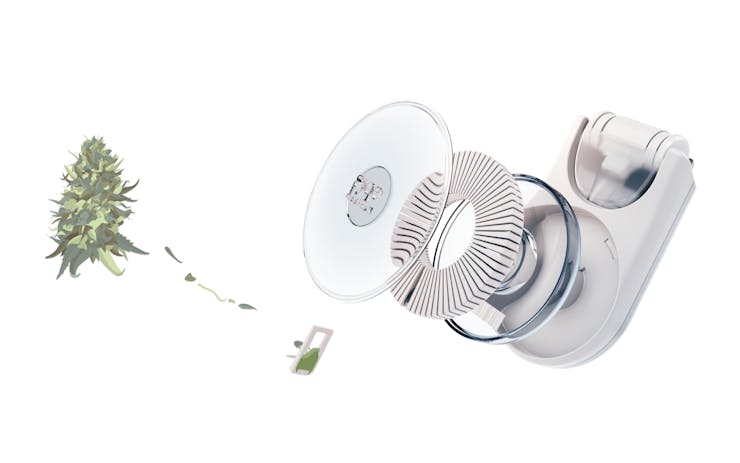Few global regions enjoy more government-backed cannabis research and investment than Israel. There, state-sanctioned medical cannabis research startup Syqe Medical has been working to create what the company is hyping as the world’s first metered-dose medical cannabis inhaler.
The device uses structurally modified cannabis that has been pre-loaded into individual “vapor chips,” essentially tiny cartridges preloaded with raw, whole-plant cannabis in order to retain the plant’s properties. This allows for precise, consistent dosing for medical patients in increments as small as 100 micrograms (0.1 mg). It’s a level of precision, Syqe said, that will allow cannabis to be delivered to patients in a “true pharmaceutical fashion” for the first time.
Using the inhaler won’t require buttons or tools. A patient merely has to seal their lips on the mouthpiece and inhale. A sensor detects the inhalation and triggers vaporization almost instantly. Data collected by the device can be viewed through a proprietary smartphone app, and doctors can monitor patient data remotely in order to adjust dosages and intake frequency.
What’s so appealing about this sort of data collection and delivery? According to Dr. Staci Gruber, director of marijuana investigations for Neuroscientific Discovery (MIND) at McLean Hospital, south of Boston, improved precision in both dosing and data collection will allow for more reliable research.
“One major issue regarding research on the impact of medical cannabis is the lack of methodologically sound research projects which provide a means for assessing actual cannabis use patterns of patients,” she told Leafly via email. “Given the wide range of methods that patients use to take medical cannabis, it is imperative to get quantifiable data regarding magnitude and frequency of use as well as information about the actual products being used, including cannabinoid constituent analyses and of course, data on how their symptoms and quality of life change as a function of taking medical cannabis (for better or worse).”
Vaping is already a popular method of consumption among both recreational and medical cannabis users, she added, but the ability to transmit quantifiable data in real time would be a boon to researchers trying to study the effects of medicines with different in cannabinoid profiles
Syqe already has completed successful clinical trials and established its proprietary technology as first-in-class in Israel, and that could have huge implications globally as regulators in the U.S. and elsewhere look for standardization and precision dosing. Success for the company could set a precedent that allows other countries and policymakers to follow suit and replace stigma with science.

Interest in the inhaler has been robust, with the startup already having raised $33 million — including a reported $20 million from tobacco giant Philip Morris International. Syqe declined to comment on the report, and a Philip Morris representative told Leafly that “the report stands for itself, we don’t have anything to add.”
To Shane MacGuill, head of tobacco at London-based market research firm Euromonitor, that comes as no surprise.” The official line is that the tobacco industry [does] not think about legal cannabis at all,” he said in an email. “However, in the real world, it would be negligent for them not to be examining the implications for them.”
Syqe isn’t alone in trying to perfect a vaporizer for the medical market. The U.K.’s National Health Service (NHS) is currently testing a product called the MediPen, a vape pen filled with a proprietary CBD oil. The pen is the first consumer cannabis product being tested by the NHS, The Independent reports, and was developed specifically to help foster a regulated marketplace.
While the legal landscape around cannabis is still in flux, Syqe said physicians and government officials from various countries, including the U.S., have expressed “great interest” in the company’s inhaler. The the Israeli Ministry of Health has cleared its use in hospitals by licensed cannabis patients, and the company expects the inhaler to become commercially available in Israel sometime next year.
Another company focused not just on medical but also consumer markets is the Stoneham, Mass.-based CannaKorp. As makers of the much-hyped CannaCloud — an elegant, single-touch, pod-based vaporization unit — the company is poised to begin a beta testing phase aimed at working out kinks and readying the device both for medical use and a general consumer rollout.
“Generally we’re operating in the states that have [legal] medical marijuana or broader adult use,” said James Winokur, CannaKorp’s co-founder and CEO. “What’s interesting is when we display [our product] to doctors … the whole concept is this a device they could use in their research.”
Michael Bourque, CannaCloud’s inventor and a company co-founder, told Leafly that the team’s goal was to create a product that, like Syqe, is simple enough for both a patient and a doctor to use. “Everything we’ve done is done through that angle. To understand what [cannabis] is doing for a patient, our system has a way to show what is happening to them. Our product and the partnerships that grow out of that can bring that kind of assurance to doctors so they, and we, can understand more about cannabis.”
CannaKorp is currently in in the process of inviting doctors and medical researchers onto its board of directors, and Bourque said some have requested the company bring a CannaCloud to their own hospitals to facilitate medical marijuana research.
“We’re setting ourselves up to address both sides, medical and recreational, as we’re really positioning ourselves to be about wellness,” Winokur said. “We can service both medical and recreational use, but as a tech company, over 10 years we can imagine all kinds of opportunity and ramifications for the platform to allow us to address evolution in this market.”
Stigma is a challenge every emerging technology manufacturer must face, especially in the cannabis space. And while startups like Syqe and CannaKorp are introducing promising new means for medical intake, they also could help usher cannabis into the mainstream more broadly. The goal, said CannaKorp VP Greg James, is to build a device that feels at home in a world where cannabis is an accepted part of life.
“I envision a day in the near future when you have friends over … and you don’t have to run down to your basement to get your medicine,” James told Leafly. “It’ll be right there besides your favorite kitchen appliance. When the conversation loses the stigma, it’s just about living a life of increased wellness.”







